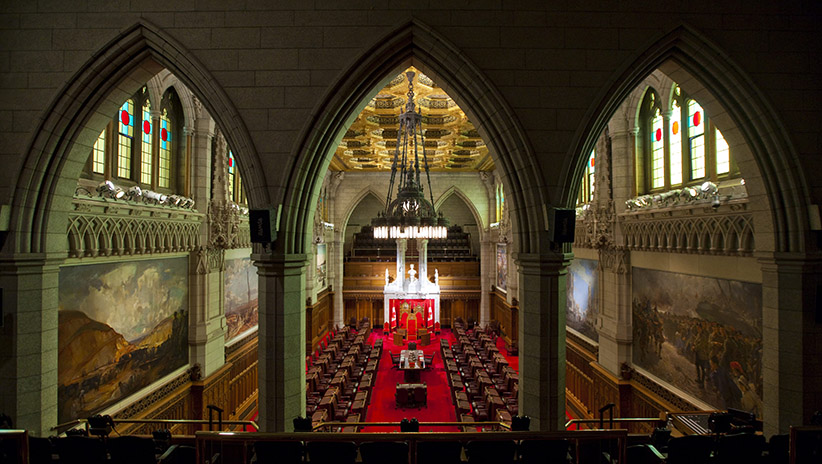How to build a better Senate? Reform it from the inside
Emmett Macfarlane advised the government on its plan for Senate reform. Here is what he has to say about today’s announcement
The Senate chamber on Parliament Hill in Ottawa on Thursday Jan. 13, 2011. (Sean Kilpatrick/CP)
Share

The federal government has announced plans for a new independent, non-partisan advisory Senate appointments process. The process is designed to emphasize merit and eliminate patronage from appointments, while avoiding the necessity of a formal constitutional amendment.
In the weeks following October’s election, I was contacted by the Liberal transition team to draft a proposal, and it appears the final process largely reflects my suggestions. A five-member advisory committee—modelled in part on the advisory committee on vice-regal appointments, as well as judicial appointments advisory committees—will conduct a consultation process and identify candidates for selection. Three members will be permanent federal appointees, with two ad hoc members appointed from the province with the vacancy. The Prime Minister will retain final discretion on the appointment, choosing from a list of candidates for each vacancy.
Related reading: How should the Senate be? (Aaron Wherry)
Today’s announcement indicated several criteria for new appointees, including a demonstrated record of leadership in community service or professional expertise, a proven record of “outstanding” ethics and integrity, and knowledge of the Senate’s role. Apparently Canadians will even be able to nominate themselves for a Senate spot (although ideally I hope members of the public will also be able to nominate people other than themselves).
The government hopes this new process will reduce partisanship in the upper chamber and, more fundamentally, result in better quality senators and a more independent Senate. Long term, it is my own hope that the sort of people appointed will be able to reform the Senate from the inside, improving its work and perhaps reducing its own powers while emphasizing the institution’s role of sober second thought.
However, the success of the new process will ultimately depend on who is appointed. Any number of problems or criticisms might arise. First, this reform will do nothing to satisfy those who have fundamental democratic objections to an unelected Senate, or who would like to see it abolished. The requirements of constitutional amendment (at least seven provinces would need to agree on an elected Senate, all 10 for abolition) make that unlikely. In effect, improving the quality of appointments might be the best we can realistically accomplish.
Second, this process might be challenged on constitutional grounds as nonetheless requiring a formal amendment. The Supreme Court ruled that the Conservative government could not implement advisory elections or term limits because such changes required provincial consent, so why is this proposal any different?
Related reading: Where the provinces stand on Senate reform
Part of the reason the Court concluded that provincial consent was required for an electoral process was because giving the Senate a “democratic mandate” would be a fundamental alteration of its essential role. In effect, elections would turn the Senate from a complementary body of review and sober second thought into a competitive body with democratic legitimacy. By contrast, the advisory process supported by the Liberals would not alter the sober second thought role of the Senate (though it may enhance or improve it). Further, where the electoral process would have been legislated and was viewed by the Court as binding prime ministerial discretion precisely because it sought a democratic mandate (the Court discounted the “advisory” nature of an specifically electoral process), this new process will not be enshrined in law and will leave the Prime Minister with the discretion to choose from the options provided or none at all.
Another criticism of this process might be that it will not amount to real change. Here, the proof is in the pudding. If, in a few years, the vast majority of Senate appointees appear to be vaguely centrist Laurentian-elite types (basically, Liberals), then I will be as disappointed as anyone. Much depends on who is appointed to the advisory committee.
One of the things I would emphasize once the advisory committee begins its work is to consider not only representational diversity (ensuring balance in the appointment of women, visible minorities, Indigenous peoples, and people with disabilities) but also broader work background or professional diversity. The Senate should not just be filled with a mix of lawyers, former politicians, and Order of Canada winners. “Community service” as one merit-based factor should extend to people who have served in the private or non-profit sectors in addition to the public. For example, it might include those who have worked “blue collar” jobs or volunteer work not often associated with Senate appointments. We’ll see.
Related reading: Justin Trudeau’s vision for the Senate (2014)
Finally, some have argued that it is either impossible or damaging to increase the Senate’s independence or to eliminate partisanship. I do not think the Senate’s functioning will be impaired if partisanship is reduced; the government should not have a problem finding a senator to usher its legislation through the upper house precisely because of the type of people—who understand the Senate’s complementary role in Parliament—it will appoint.
That said, the government should be cautious in attempts to formally bind the behaviour of new appointees. New senators cannot be expected to sign “I will remain non-partisan” contracts. Independence is exactly that, and senators are free to organize or affiliate as they choose.
The proposed process is at once a meaningful but modest reform. It has the potential, I hope, to improve the quality of appointments and to bring a small measure of added legitimacy to a widely reviled institution. Despite being a democratic anachronism, the Senate is capable of performing an important review and research function. I hope this new process will serve to better enable it.
Emmett Macfarlane is an assistant professor of political science at the University of Waterloo.